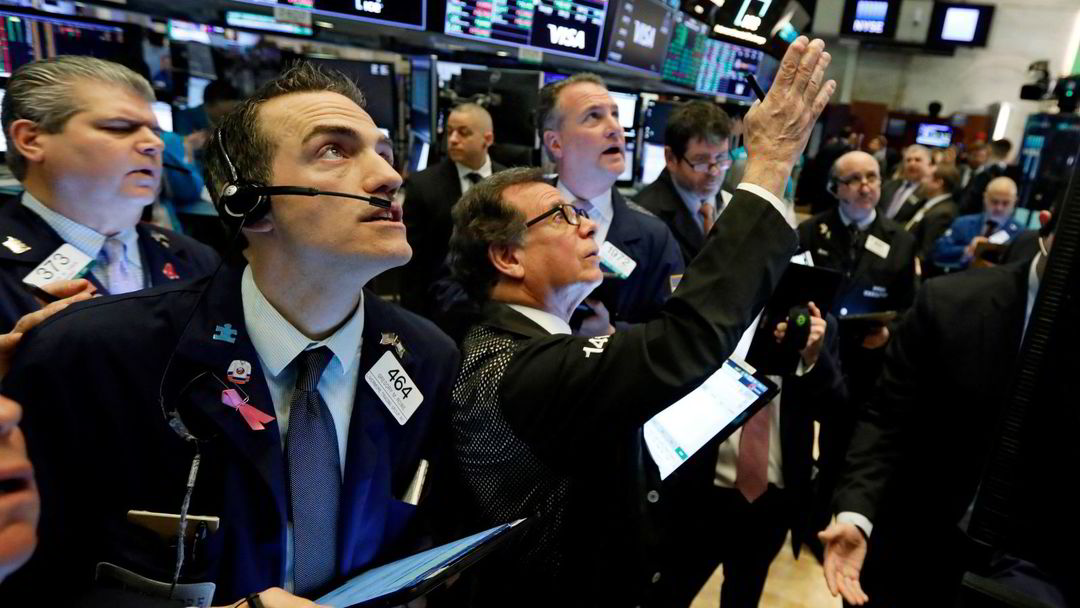–
Russia’s invasion of Ukraine led to a sharp fall in the stock market from the start of the leading indices on Wall Street. The Dow Jones was down 2.55 percent, the S&P fell 2.5, while the technology-heavy Nasdaq index fell over 2.7 percent just after opening.
Throughout the trading day, both the Dow Jones and S&P have been marked by marked declines, while the Nasdaq has wavered between ups and downs, before rising sharply towards the end of trading.
This is what it looks like with the three leading stock exchange indices at closing time:
- The industry-heavy Dow Jones index is up 0.28 percent.
- The Nasdaq technology index is up 3.34 percent.
- The broad S&P 500 index is up 1.49 percent.
– From a purely economic point of view, this is not dramatic for the West at all
The stock market has been characterized by unrest since the beginning of the year, but after the situation with Russia escalated, stock market unrest has increased considerably. However, Investment Director Leif-Rune H. Rein of Nordea Liv says that the invasion of Ukraine has little significance for the Western economy, once it has become a fact.
–
– Today’s invasion was expected and the markets have had plenty of time to praise it. Now that the uncertainty about what would happen subsides, the market realizes that this has little significance for the further earnings of the companies in the West and the indices rise, says Rein.
Wall Street fluctuated sharply on Wednesday and the Dow Jones ended with a fall of around 464 points, or 1.3 percent. At closing time, the index was at its lowest level so far this year. The S&P 500 fell 1.8 percent, moved deeper into correction and ended Wednesday with about 12 percent decline from the record closing on 3 January. The technology-heavy Nasdaq Composite lost 2.6 percent on Wednesday.
Nervousness and unrest have also marked large parts of the trading day on Thursday. However, after US President Joe Biden introduced new sanctions against Russia and announced that the US will open strategic oil reserves to counter the sharp rise in oil prices, however, the wind in the three indices turned.
– For western countries, the sanctions are to live with, and it is not certain it would have mattered if they were tougher.
After closing time, Nasdaq is up over three percent, which we say that the index has risen well over six percent during the trading day.
– It is war, and it will probably cause fluctuations on the stock market in the future, but financially this is not dramatic for the West, says Rein.
Market reactions Thursday after Russia invaded Ukraine:
- US stock market indices fell over two percent in pre-trading on Thursday.
- Stock market falls have affected the stock markets in Asia and Europe on Thursday.
- The energy companies, on the other hand, are experiencing an increase as raw material prices climb further upwards as a result of the situation.
- Brent spot North Sea oil, used as a reference price for oil trading worldwide, jumped 7.7 percent to $ 104.56 a barrel. The oil price thus passed the 100-dollar level for the first time since 2014.
- European gas prices rise sharply: The Dutch monthly contract jumped over 40 percent to 125 euros per megawatt hour on Thursday, Bloomberg reports.
- In the fixed income market, there is also movement, and the US ten-year fell above 10 basis points on Thursday night. At the moment, the ten-year-old is trading at 1.87 percent. At the same time, interest rate expectations in the US have fallen after the war in Ukraine has picked up.
Oil prices fell
Fears that Russia’s energy exports could be curtailed or halted have sent oil prices to record levels. During the day, oil prices plummeted $ 104 a barrel. However, shortly after Biden’s announcement that the United States was opening up its strategic oil reserves, oil prices fell sharply. At 22 Norwegian time, a barrel of Brent Spot North Sea oil is traded for just over 99 dollars.
–
Energy companies rose as a result of rising commodity prices in pre-trade. Devon Energy rose five percent and Chevron rose 4.2 percent in pre-market trading. At closing time, however, Chevron and Devon Energy shares are down 0.52 and 1.49 percent, respectively.
Bank shares were among the big losers in the pre-trade. Bank of America and Bank of New York Mellon fell more than four percent during the day. The shares recovered, however, and are down 2.66 and 1.59 percent, respectively, after trading is over Thursday.(Terms)Copyright Dagens Næringsliv AS and / or our suppliers. We would like you to share our cases using a link, which leads directly to our pages. Copying or other use of all or part of the content may only take place with written permission or as permitted by law. For additional terms look here.
–


